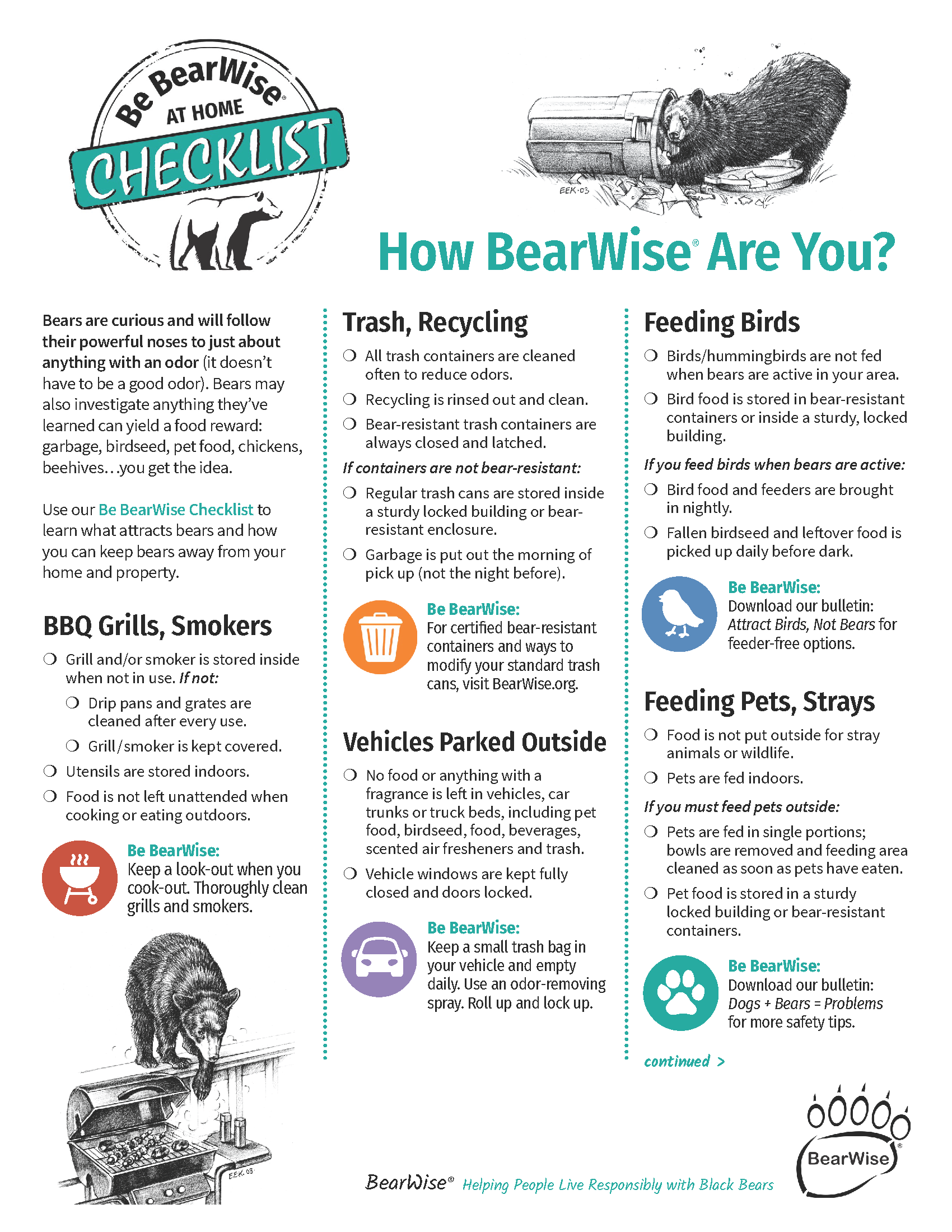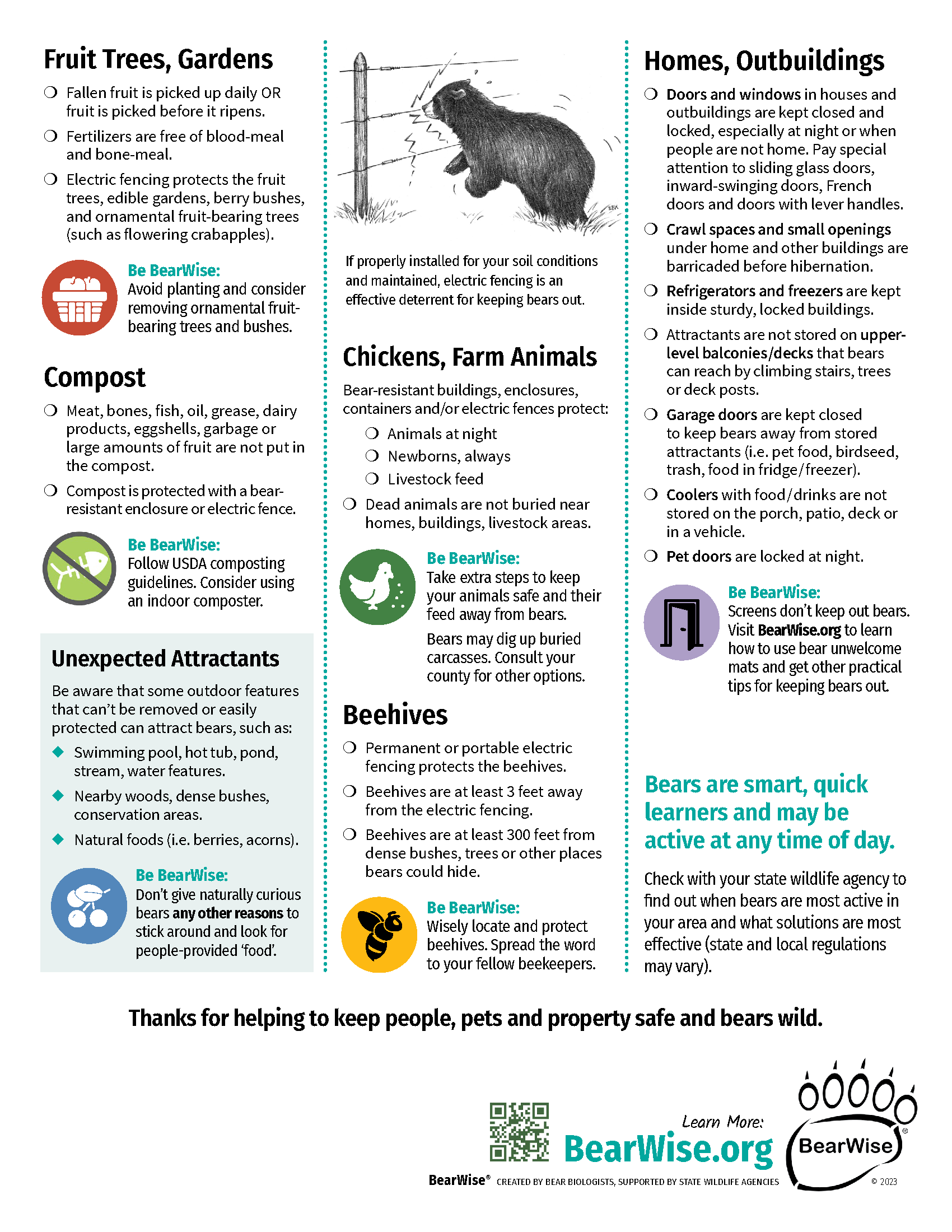How To Keep Tahoe Bears Wild
Living in Bear Country
Use bear-resistant garbage cans. Bear-resistant garbage cans and containers are needed in bear country. Additionally, store garbage in a secure building or enclosure and always wait to put garbage out until the morning of collection. Contact your local waste management company to learn about various types of bear-resistant garbage cans, bear boxes and receptacles. There may also be incentive programs to offset costs of the purchase.
Close windows and lock your home. Keep doors, garage doors and windows closed and locked when your home is not occupied. Reduce the potential for hibernation under structures by blocking access to sites, such as crawl spaces under decks and buildings. Be sure to lock the doors and close the windows of your cars too!
Keep bears away from neighborhoods. Prevention is key. Fruit trees, hanging bird feeders and beehives are sure to bring bears to the neighborhood. Manage all food attractants around the home and encourage neighbors to do the same. Never leave pet food, beverages, coolers or other attractants on your porch, deck or in your car. A dirty barbecue grill will also entice a bear to visit. Keep grills clean and stored when not in use.
If a bear does come around your home, suggested methods for deterring the bear include yelling, clapping your hands, or making other noise to convince the bear that neighborhoods are not fun! Only do so if you are a safe distance from the bear and never block a bear’s escape route. Never corner a bear. Individual bears display varying levels of tolerance to humans and each situation is unique.
Visiting Bear Country
Do not feed bears or other wild animals. Bears that become accustomed to human food and garbage lose their natural fear of humans, which may lead to the injury of a person or euthanasia of the bear. Feeding other wild animals will attract bears. You may also be cited by law enforcement for feeding wildlife.
Dispose of garbage properly. Litter and overflowing garbage cans provide bears with an endless source of food and teach them that being in human-occupied areas is easier than searching for natural foods. If a public garbage receptacle is overflowing, do not use it. Pack your garbage out. If you see an overflowing receptable, please report it to the proper authority. Vacationers should not put garbage out on curbside before collection day.
Never approach bears or cubs. Leave bears alone. Do not impose for sightseeing or photo taking purposes. Always keep a safe distance. Bears are wild animals and can be unpredictable -- even dangerous.
Prevent vehicle break-ins. Always remove any scented items from your vehicle, including items, such as food wrappers, sunscreen, lip balm, hand lotion and scented air fresheners. Be sure to always lock your vehicle and close the windows. Keep in mind eating in the car leaves lingering food odors that attracts bears.
Playing in Bear Country
Keep a clean campsite. Clean picnic tables and wash dishes after every use. Don’t burn food or packaging material in grills of fire pits.
Use bear lockers. Always store food and ice chests in bear lockers provided at campgrounds. If lockers are not available, use a bear-resistant ice chest and secure it with a padlock. Dry food, toiletries and scented items should be stored in bear-resistant food storage containers. There is a wide variety of bear-resistant food storage products available at camping and outdoor stores. Never leave food in a tent or sleeping bag.
Respect wildlife and keep your distance. Hike in groups. Stay alert and make noise to avoid surprising bears. Watch for bear signs, such as scat along trails or claw marks on trees. Keep dogs on a leash.
Bear Canisters Required in Desolation. Bear canisters are required for overnight visitors in Desolation Wilderness. Overnight visitors must store all food, refuse and scented items in an approved hard-sided bear-proof container. This is an important step toward keeping Tahoe bears wild.
Bear safety:
If you see a bear, and it does not see you, stay calm. Pick up small children and dogs. Restrain larger dogs by putting them behind you. Back away. Increase distance and make noise so the bear knows you are there and will leave the area. Alter your route if necessary. If the bear has seen you and is surprised or curious, DO NOT RUN. Don’t act aggressively. Show the bear you mean no harm by talking softly and calmly. Back away slowly while facing the bear and alter route. If a bear approaches you, stand your ground and try to make yourself appear larger by raising your arms above your head or if wearing a jacket opening it wide. Black bear attacks are very rare, but if attacked, fight back.
Every bear encounter is unique and situational. There is no single response strategy that is guaranteed to work all the time. However, following the basic safety rules provided will help prevent conflict.
Safety guidelines provided applies to American black bears only. Grizzly bears are not found in California or Nevada.

